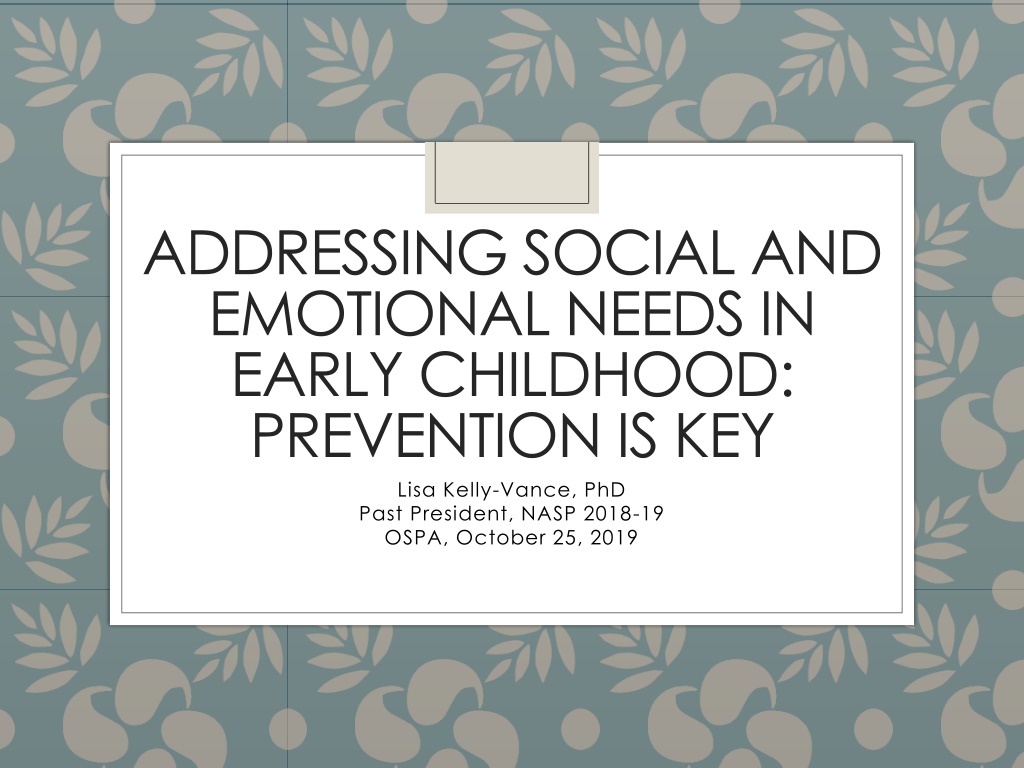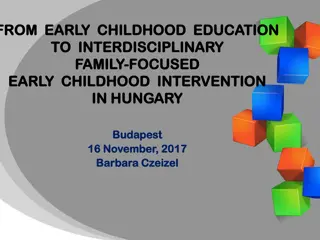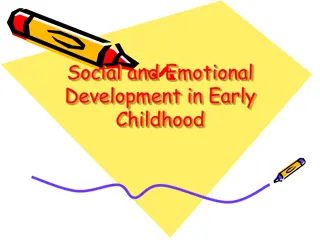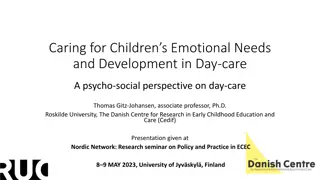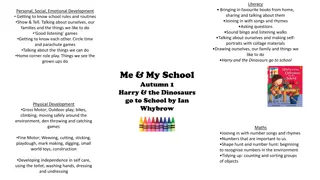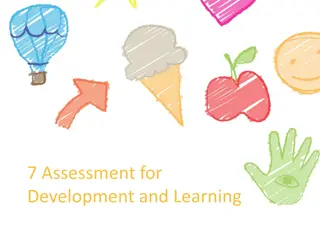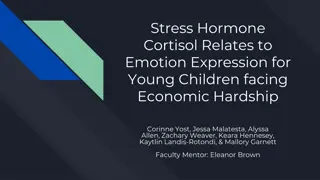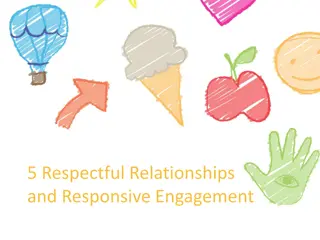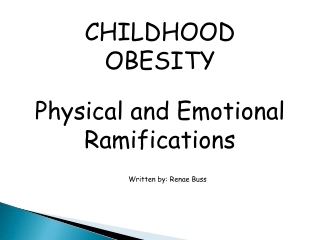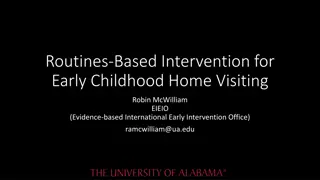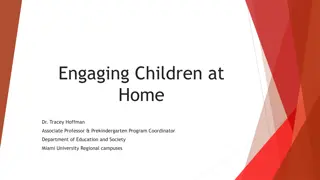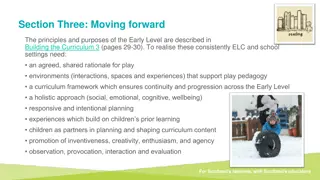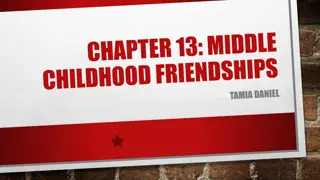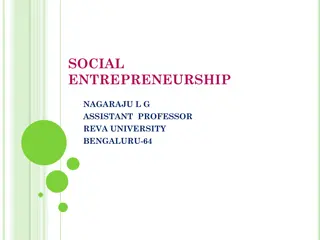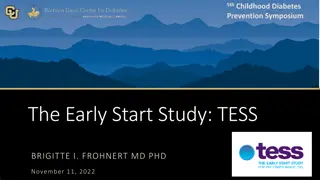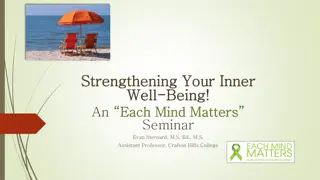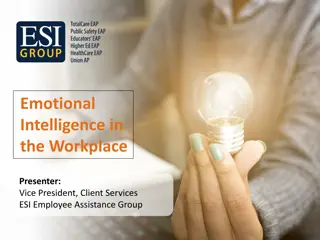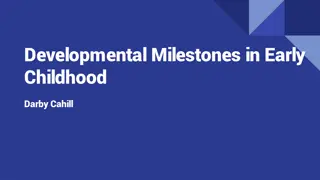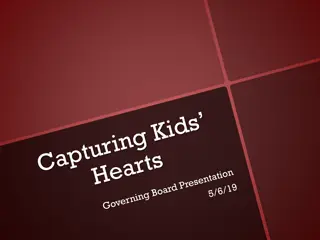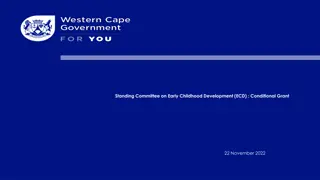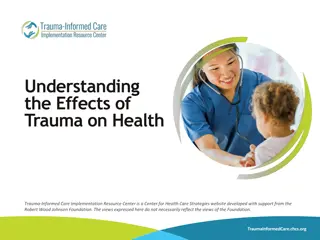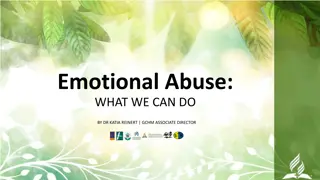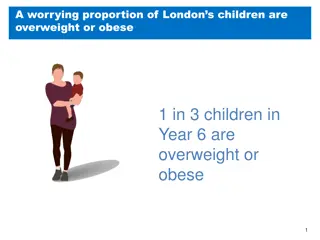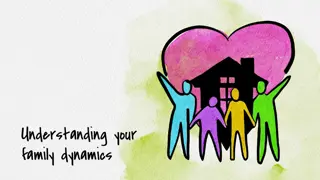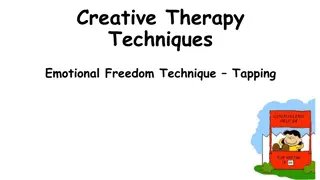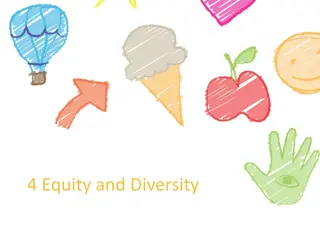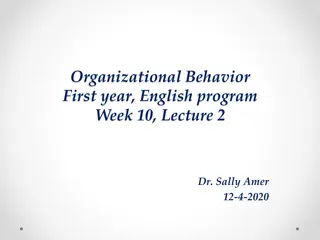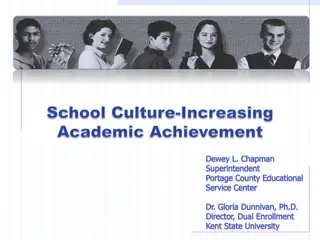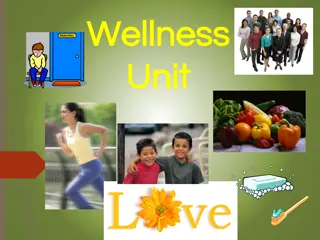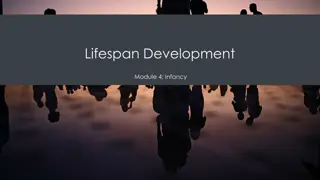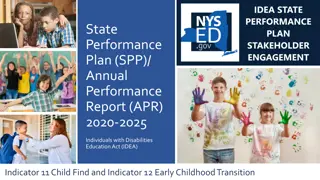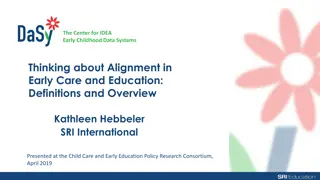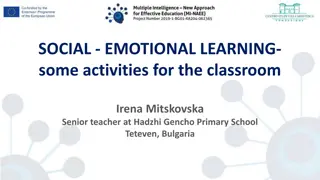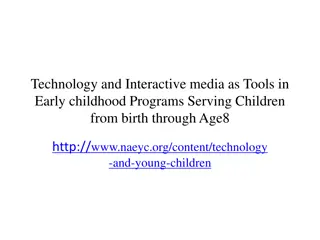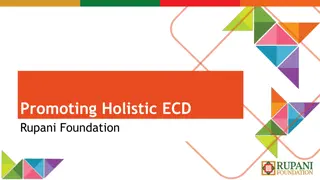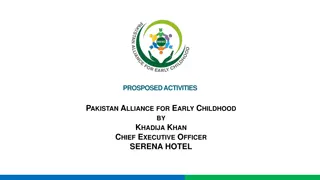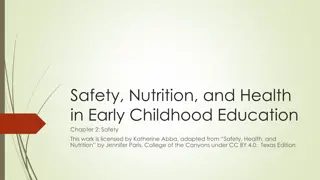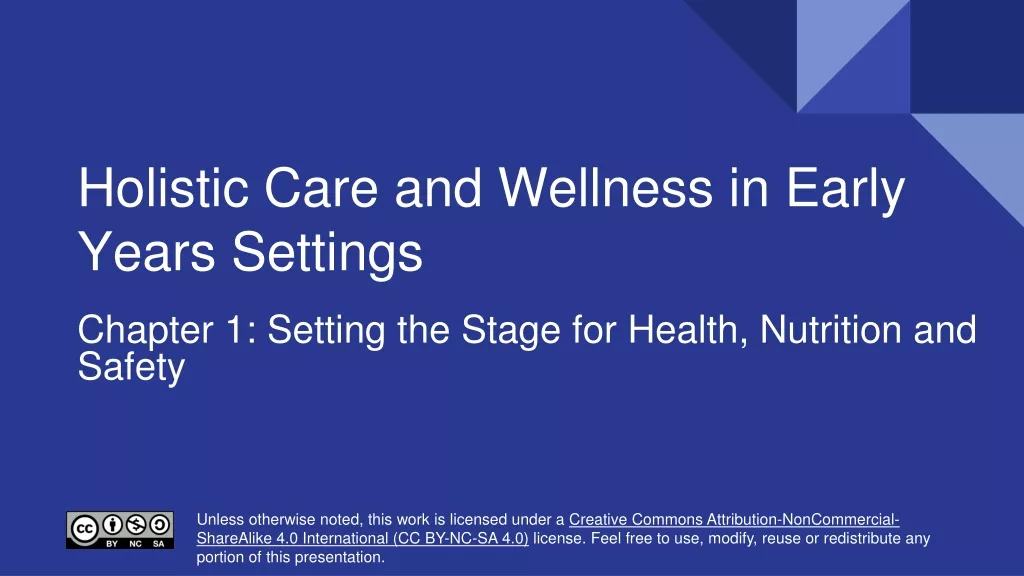Understanding Social and Emotional Needs in Early Childhood
The early years from birth to age 8 are crucial for developing intellectual, social, and emotional skills that set the foundation for success in school and life. Educating parents about children's emotional capabilities, supporting caregivers, and intervening early can significantly impact children's mental health and well-being. Common mental and behavioral health issues in young children include anxiety, conduct disorders, ADHD, depression, and social skills deficits. Recognizing early childhood distinctions in behaviors such as anxiety and oppositional defiant disorder can help in providing appropriate support and intervention.
Download Presentation

Please find below an Image/Link to download the presentation.
The content on the website is provided AS IS for your information and personal use only. It may not be sold, licensed, or shared on other websites without obtaining consent from the author. Download presentation by click this link. If you encounter any issues during the download, it is possible that the publisher has removed the file from their server.
E N D
Presentation Transcript
ADDRESSING SOCIAL AND EMOTIONAL NEEDS IN EARLY CHILDHOOD: PREVENTION IS KEY Lisa Kelly-Vance, PhD Past President, NASP 2018-19 OSPA, October 25, 2019
The greatest opportunity for lifelong impact on children s development is in the years from birth through age 8. Decades of research point to the early years as the most critical time for building intellect, strengthening social and emotional skills and setting a positive trajectory for school and life success. -Buffett Early Childhood Institute
Why our work is important: Parents Misconceptions 44% of parents thought infants and young children could tell if a parents was angry or sad 43% of parents thought children could self regulate their emotions by age 3; 20% thought they could regulate by age 2 Parents tend to look for signs similar to adult expression. It is our responsibility to get accurate and helpful information to parents and caregivers.
Good news Mental health in young children is more influenced by environment than genetics. Supporting the parents/caregivers helps provide an environment where children s mental health and well being can flourish. Early intervention greatly reduces mental health problems. Children s behaviors have meaning and we can learn to better interpret their needs.
Major Areas of Concern 9.5-14.2% of children age 0-5 have mental/behavioral health issues. Most common MBH issues in early childhood are: Anxiety Conduct disorders ADHD Depression Social Skills
Early Childhood distinctions Anxiety Level of impairment results in the child not engaging in behaviors typical for age E.g., refusal to separate from parent when given opportunity to play with peer May not state the actual feeling of fear or anxiety Express anxiety through behavior defiance, avoidance crying, clinging to adult Often mistaken for oppositional behavior or irritability
Early Childhood distinctions Oppositional Defiant Disorder Irritability, restlessness, negativity, aggressive behaviors, hyperactivity Not as sensitive to rewards harder to change behavior Based in the brain amygdala ADHD Hyperactive and impulsive behaviors typically develop earlier than inattention. Ratings of parent stress are highest when these children are preschool age. Parents report that the children are: More demanding of them More stressful to manage Less reinforcing to them as parents Less able to adapt to change Less compatible with parents and siblings 16% are expelled from preschool 40% are suspended from preschool (compared to 0.5% of children without ADHD)
CURRENT OBSTACLES
Kindergarten - What is happening? Play has declined over the past several decades Anxiety and depression have increased The story of Finland Minimal direct teaching of reading in Kindergarten The curriculum is play By 3rdgrade, student reading skills are at grade level
Preschool Expulsion Who is getting expelled? 27 per 1000 children Compare to 2 per 1000 in K-12 4 year olds are more likely to be expelled than 3 year olds Black children 2x more likely than white children Boys 4x more likely than girls Reference: Gilliam & Sharhar (2006) Preschool and Childcare Expulsion and Suspension, Infants and Young Children, 19 (3).228-245.
Preschool Expulsion Is it because of children s mental and behavioral health? Adult behaviors are better predictors of preschool expulsion than child behaviors High child: teacher ratios Higher rates of job stress in teachers Length of day longer program, more likely to refer No resources for behavior support
Play and Mental Health The decline in play has been correlated with the increase in anxiety and depression. Play is intrinsically rewarding to children. Play helps children feel a sense of control in their world. https://www.zerotothree.org/early-learning/play Through play, we can help children with their mental and behavioral health needs. Play allows children to practice skills.
SHIFTING TO EMPOWERMENT
Prevention Build resilience in children address their mental health and behavioral needs Work with parents/caregivers to do the same It s more efficient, both biologically and economically, to get things right the first time than to try to fix them later. We ve learned that brains, skills, and health are built over time, but starting early is what counts. Neuroscientists tell us that the window of opportunity for development remains open for many years, but the costs of remediation grow with age. National Scientific Council on the Developing Child (2007)
The Importance of Prevention $1 invested in Early Childhood gets a $7 return later in life Reduction in Special education Social services Criminal behavior Increase in Physical and mental health Family self-sufficiency Heckman (2006)
But first.Child Find We need to be more strategic in finding young children with mental health concerns. We have to prevent these problems from getting worse.
WHAT TO DO WHEN WE FIND THEM
The Mega To Do List Increase Parent/Caregiver Skills Research consistently demonstrates that improving parenting improves child outcomes. Parents want more information about how to help their children Supported by research Assume it is a can t do rather than a won t do Increase Teacher Skills Behavioral Consultation Increase Child Skills Direction Instruction Social Skills Play Emotion regulation All of these address the mental health needs by teaching parents/caregivers and children
Intervention Strategies Provide information to parents and caregivers Increase parent/caregiver skills Conduct Social Skills Training Increase opportunities for play and Implement Play Interventions Emotion regulation Social skills Alternate behaviors e.g., positive play skills
Getting information to families: Distribute fliers and promote MBH services Churches Apartment buildings Child care centers Pediatricians Groceries Mini Marts Drug stores Parks Schools SLPs Home visitors NextDoor app FaceBook Health Care Clinical psychs Public agencies
Getting information to families Sesame Street addressing violence and other topics Sesamestreetincommunities.org Information about the importance of play and how to enhance your child s play Information about social/emotional development https://www2.ed.gov/about/inits/ed/earlylearning/talk-read- sing/feelings-milestones.pdf Zero to Three https://www.zerotothree.org Pinterest has lots of charts
Brain Building Moments Brain Building Moments http://joinvroom.org/science-and-facts Took science, put it in a 5thgrade reading level. The put it in small information bytes. Collected data on what parents in poverty wanted for their children they wanted a better life for them and wanted to know the science for how to do it. the science for how to do it. http://joinvroom.org/science-and-facts Took science, put it in a 5thgrade reading level. The put it in small information bytes. Collected data on what parents in poverty wanted for their children they wanted a better life for them and wanted to know
Supporting Teachers Share information about anxiety, depression, conduct disorders, social skills Mental and behavioral health consultation in early childhood Reminder: The relationships teachers form with children is critical. A positive, warm, encouraging, responsive, and supportive teacher can make a huge difference in the social-emotional and educational outcomes of young children.
Addressing Anxiety in Classrooms and at Home Let s talk about the good things that happened today. Exposure therapy use breathing techniques during exposure Exposure is better than avoidance Calming Jars Empty bottle, warm water, glitter paint Calming Kits
Training Parents about Play Parents and caregivers see play as a way for children to have fun, not as a learning opportunity. Why it is important for parents to understand play Play is serious business for children. www.Plaisuno.com
Parent example Dempsey et al 48 month old male Autism, speech-language delay 6 week intervention 1 on 1 intervention with parent (with graduate student as a consultant throughout) Mother was taught through a training program how to increase her son s play Increase in pretend play 8 steps in sequence at post test (single step at pretest) Multiple step sequences observed 3 times at post test (0 times at pretest) Qualitative changes: Child s mother reported more social play between the child and his brother Child was more easily encouraged to play with new toys Mother observed many more pretend play behaviors
Child Interventions Social skills instruction includes emotion regulation Play training Some children need direct teaching of play Play and Behavior - Gillaspie implemented 4 weeks intervention with 3 children (24-48 months of age) with severe behavior needs. Had a comparison group. Increases found in percent of time spent in pretend play and highest level of play.
Social Skills Training covers mental health Eg. Skillstreaming in Early Childhood Uses well-researched procedures: Modeling Role-playing Feedback Transfer Skill Categories Beginning Social Skills School-Related Skills Friendship Making Skills Dealing With Feelings Alternatives to Aggression Dealing With Stress
Skill - example Relaxing 1. Think about how you feel. 2. Take three deep breaths. 3. Squeeze the oranges. (Imaginary)
Can we do this? Yes, we can! We don t have a choice. Children and their families are depending on us.
